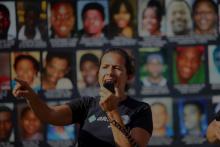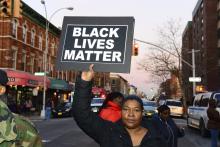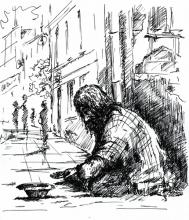Mark

Sometimes there are no advocates, no allies, no other choices but to be the one to take a risk with no guarantee or promise of success, of justice, of healing.

There are many reasons for divorces and one of them is domestic violence. It’s true that there are women and men who experience domestic violence and never leave the marriage; they only want to cleave while others leave for their dear life. Domestic violence can be viewed as family violence but there are family members from whom we may rarely hear in these situations, namely children. Most certainly, domestic violence impacts the perpetrator and victim yet if there are children in the same space, they, too, will be affected. They, too, may even be beaten, battered, and bruised. This is the blues-inflected struggle of life.
The book of Mark focuses a lot on the suffering of Jesus. Pain seems to have some privilege in the way Mark preaches the gospel. He keeps it real. Mark is a truth-teller because even today many travel a trail of tears. The level of pain and the type of pain vary. But the honest truth is that life is not a bouquet of sweet-smelling roses. There are thorns and fractures. There is brokenness — broken bodies and relationships — so it is of no surprise per se when we see Jesus and the Pharisees engage in a conversation about marriage and divorce, topics that may heighten our awareness of human brokenness in our society. It’s no secret that many marriages fail and end in divorce, whether they are people of faith or not.

I practiced family law in California for many years. I know the anguish of the breakup of a marriage. Often one spouse would come to me to try to untangle the legal mess of a marital relationship. What I noticed was how much ambivalence went into the process. So many wished that they could salvage the marriage but for a myriad of reasons it was not possible. Sometimes there were situations of domestic violence, impossible economic pressures and a host of other impossible hurdles. And more often than not, my clients felt judged and ostracized from their church and circle of friends. It was a lonely road to try to find a way beyond the harsh judgments.
The Mark 10 text is a challenging gospel in our society that has a high divorce rate. But I have a hunch that there is a deeper truth that Jesus was trying to get at. First the Pharisees were trying to trap Jesus so Jesus responds by tweaking the Pharisees. The Pharisees were playing a game of “gotcha” where they could claim the high ground and discredit this revered teacher. Jesus says in that context that marriage is about love and unity, commitment and engagement. The Pharisees want Jesus to draw the clear bright line that all can easily judge. But life is not so simple.

It is after the resurrection that Jesus’ mission to the Gentile community begins in earnest, but here in this passage Jesus is challenged on this assumption of being sent to the Jews first and foremost. And after he is challenged, he answers in a positive manner. He affirms the Syrophoenician woman and heals her daughter. Her faith got her what she wanted.
But it would not have happened had she not interrupted him in his attempt to find a quiet moment. It would not have occurred without her persistence. She probably knew “her place” since she was a first century woman in a culture where women had little to no voice or power. But she did not stay there. She acknowledged “her place,” but she asked for mercy and had the faith that her request could/would be granted.
And her faith paid off. Her daughter was healed.
So what about these women who took to the stage for #BlackLivesMatter?

How does a social movement begin? How does frustration meet courage and conviction to bring a people together to engage in transformative work? What seeds do we plant to change a nation?
Social movements do not form out of thin air. They arise out of people’s suffering. Social movements are rooted in moments when people decide to change the conversation. The growing momentum around this new conversation creates a movement — a swell of influence in society that has the potential to change minds and transform society.

Sparked by the shooting death of Mike Brown in Ferguson, the subsequent deaths at the hands of law enforcement of Eric Garner in New York and 12 year-old Tamir Rice in Cleveland, protests under the banners of #ferguson, #icantbreathe, and #blacklivesmatter have spread around the country and a passionate conversation about the role of race in America has been rejoined. These protests, along with coverage by news media and the voices of social commentators and faith leaders — as well as the well-timed critical success of the movie Selma — have moved matters of race to the fore of our cultural consciousness and conversation in a way rarely seen since the Civil Rights movement of the 1950’s and 1960’s.
And yet, despite this heightened awareness about the experience of people of color, there remains a great distance and disconnect between white and minority communities regarding not only the actions of law enforcement, but also the varied manifestations of systemic and institutional racism. Indeed, the very real troubles experienced by communities of color are largely invisible to many whites. In Ferguson itself, many whites prior to the death of Mike Brown reported being unaware of the tension between African-American community and law enforcement. Nationwide, whites and African-Americans had very different perspectives. Whereas 80 percent of African Americans said Mike Brown’s shooting raised issues about race, only 37 percent of whites said the same.
In a time when renewed engagement is desperately needed, it is difficult to have dialogue when a vast majority of whites cannot empathize with the experience of communities of color, or, in some cases, acknowledge that there is a problem at all.

Is poverty what it used to be? Or has poverty grown so shameful that we dare not speak its name? So determined are we keep poverty out of view, we erase the presence of the poor from Jesus’ teachings. The widow we encounter in Mark 12:38-44 provides a case study in poverty and oppression. Unable to confront poverty, we have turned her into something safer – an example of generosity.
The election has just passed. As I’m writing this, I don’t know who will win. I do know this: neither presidential candidate could work up the courage to address poverty as a serious issue, at least not directly. If Democrats typically look out for the poor, you wouldn’t know it from President Obama; Mitt Romney mentioned the poor more often than did the president, if only to remind voters that the economy is struggling. For his part, Obama avoided the “p-word,” even if he discussed policies that could remedy the poverty problem. Some of our political leaders do include the poor in their policy work, but they face an uphill struggle.

Were I one for object lessons I’d have brought a nice sharp axe with me into the pulpit today. Because it’s only once in awhile that we get to hear Jesus talk about brutal self-mutilation as a sign of discipleship.
Growing up I was terrified of those verses in Mark’s Gospel that we just heard – the ones where Jesus suggests that if your hand causes you to sin cut it off, and if your foot causes you to sin hack that off too, and if your eye causes you to sin gauge the sucker out. I remember the summer I was 11 years old when I stole candy from KMart and then hid it in the heat duct in my room. And I remember hearing this passage soon after that and thinking how my hand had indeed caused me to sin. And then and there I decided to never steal again lest Jesus insist I hack off my own limbs.
The problem, of course, is that my hand has never caused a darn thing. My eye doesn’t cause me to sin. My foot can’t be held accountable for my missteps. If you want to find the culprit behind my sin don’t look at my hand. Look at my heart. My poor feet just do what they’re told.
It's funny the things that you remember. I can remember one time when I was a teenager watching an episode of the Montel Williams show. I don't remember the topic, but I do remember Montel criticizing the U.S. government for spending too much money on military defense and not enough on domestic needs. I remember thinking to myself, "That's the stupidest thing I've ever heard." In the world that I knew, the idea of slashing military spending was absolutely, totally, utterly UNTHINKABLE! I personally had never met anyone who thought that way, so I assumed that anyone who would suggest such a thing had to be either a) naive; b) stupid; c) a tree-hugger; or d) unAmerican.
That was then.
I don't know if it's because I changed or because America has changed (or both), but for years it seemed like the only ones who suggested slashing military spending were groups that few Americans could identify with: like hippies, pacifists, environmental and civil rights activists, and conspiracy theorists. Today, the idea that a significant portion of the nation's economic woes is due to wasteful Pentagon spending can be found both on the left and on the right ends of the political spectrum. It can also be found in the Pentagon.
Meet "Mr. Y."

As Christians concerned about poverty, it is time to turn our full attention to the injustices of an "offshore tax system" that enables corporations and the wealthy to dodge taxes and impoverish countries around the world.
As members of Congress in the United States debate deep and painful budget cuts, people of faith should raise our voices against an unfair system that enables profitable U.S. corporations to dodge taxes, depleting an estimated $100 billion from the U.S. Treasury each year. Instead of cutting $1 trillion over the next decade from programs that assist the poor and ensure greater opportunity, we should eliminate these destructive tax gimmicks.
Recent reports show that aggressive tax dodgers such as General Electric, Boeing, and Pfizer, avoid billions in taxes a year. They use accounting gymnastics to pretend they are making profits in offshore subsidiaries incorporated in low- or no-tax countries like the Cayman Islands, thereby reducing their tax obligations in the United States. This system is unfair to domestic businesses that have to compete on an un-level playing field.
 Seeking justice for the oppressed. Working to end the connection of child slavery to chocolate. Helping heal a devastated Haiti. Mobilizing young people to respond to a story of redemption by imaginatively working to build a better world. I think many of us Christians would hope that those words were describing the work of the body of Christ, intent on following the path of Jesus Christ in this world. In this case, they are actually descriptions of the Harry Potter Alliance. That's right -- the Harry Potter Alliance.
Seeking justice for the oppressed. Working to end the connection of child slavery to chocolate. Helping heal a devastated Haiti. Mobilizing young people to respond to a story of redemption by imaginatively working to build a better world. I think many of us Christians would hope that those words were describing the work of the body of Christ, intent on following the path of Jesus Christ in this world. In this case, they are actually descriptions of the Harry Potter Alliance. That's right -- the Harry Potter Alliance.
There's a scene in the film Food, Inc. that reveals the hypocrisy at the heart of U.S.